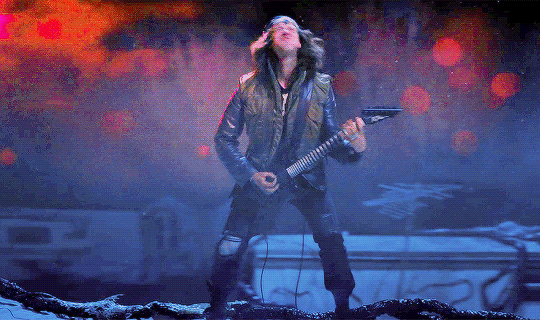Text
SongWriting like the Pros
Recently, I got to sit down and write with a friend of mine who plays guitar for a famous rock band (800,000 monthly listeners on Spotify). We're going to call him Kaden. During our session, he showed me a lot about how the producers his band works with write songs (industry-leading names mind you) and I thought it was a fascinating charge of pace from my usual approach. So here, dear reader, is the entire session step-by-step.
(In case you don't care to read this entire post, the most interesting part is towards the bottom.)
The session started with what Kaden called "Therapy Mode". We sat down without the instruments and just started chatting. "What's new? What have you been thinking about this week? What do you feel about x y or z?" until we landed on a good prompt for a song. He specified that a good prompt should be "unique to you, but relatable to everyone else". During this process, we also wrote down any specific phrases that came to mind as we figured out what we wanted to say. More on this later.
When we had the prompt, we started playing with chords. Kaden said we should start with "grandpa chords", ie. the standard open chords that you learn in the first 2 weeks of playing the guitar. As much as I love finding unique chords and voicings, Kaden insisted that vocal melody was more important, and that unique chords should come AFTER a solid melody is written. It is also important to note that we specifically started with the chorus of the song, ie. the most important and memorable part.
Once we agreed upon a chord progression, we started playing with the melody by singing gibberish. The idea was to trust your ears to find something catchy. Kaden kept saying "Don't think so hard, just sing what makes sense".
Next, we started to formulate lyrics. It's important to note that the melody and the lyrics were developed at the same time. We had a rough draft melody that we built off of, but weren't afraid to change if the lyrics required it. For the lyrics on the chorus, Kaden said they should "be simple enough that an 8th grader would write it on a notebook" because "no one obsesses over lyrics like 8th graders". Even if you are a writer who loves to use metaphors to hide the meaning of their lyrics, the chorus should be fairly straight forward. During this stage, we tried to use each of the phrases we had written down earlier.
As the pieces fell in place, Kaden started to nitpick every decision we made. Some melodies were rewritten, some lyrics were scrapped, and a chord or two were changed. The important thing during this stage is not to get attached to anything you've previously decided on. You don't want to miss out on something better because you're too obsessed with your first idea.
When we finally figured something out that we both liked, I made the assumption that we would start detailing the song by making the chords more interesting, writing the verses, adding harmonies, drums, etc. I was WRONG. When I finished playing what we had written, Kaden hit me with "Cool, let's start over."
Here's the part the blew my mind. Kaden, his band, and every major producer they work with only do 1 thing 90% of the time: write choruses. They write a chorus with just vocals and simple chords and then move on. They don't finish the songs until they decide to write an album.
To put this into perspective, their vocalist is constantly writing 30 second choruses, year round. Last time Kaden's band sat down to do an album, they had 146 demos to pick from. 146! From there, they narrowed the list down to the best 12 and finished each song like this:
Chorus (with completed instrument parts) -> 1st Verse -> Intro -> 2nd Verse -> Bridge -> Outro
Essentially, once you have a really solid chorus, you want to figure out how the song should go leading up to that chorus and then write to the end after that. Last thing I'll leave you with is Kaden's response when I asked why we wouldn't finish the song we had started. "Why spend the time to finish this one if the next chorus we write is 10x better?"
What do you think about this method? Is this something you'd like to try?
47 notes
·
View notes
Text
Rhyme Schemes can be your Friends
To my fellow lyricists and poets, remember to use different rhyme schemes and patterns when you get stuck. Not every line needs to rhyme with the very next one. Here's how I like to look at it (featuring shameless plugs to my own music):
Rhyme Schemes/Patterns exist on a spectrum. I call the left-hand side of the spectrum "Extended Patterns", the middle section is called "Standard Patterns", and the far-right side I call "Compressed Patterns".
Standard Patterns look like the poetry you used to read as a class in 3rd grade. A typical scheme in this zone is something like AABB, or in this example from the song "Haunted" off my band's first album, AAAA. (Note the rhymes in this case come from the vowels, not the ending consonants).
I might be afraid
Of what I have to say
But there's too much at stake
For me to walk away
Extended Patterns take longer to wrap up their rhymes, which I find incredibly useful when I want to communicate my message as clearly as possible. In this example from the song "Malevolence" I use the pattern ABC-DEC.
Tell my brother that I'm sorry
I know you tried to find your way
And I know that you regret the way you lied
Made me promise not to burn you
At the stake where you belong
And I know you thought of me each time you cried
Compressed Patterns are most often found in Rap and HipHop and feature lines with several rhymes back to back to back. Watch an analysis on Eminem's lyrics one day if you really want to see this in action. Here's a smaller example from my band's next single "Nomad", where the patten is AA(BB)A. Notice that the B rhymes happen back to back in the same line.
I've gotten sick of my tells
Teach me to lie to myself
I've got a feeling that I'm dealing
With my personal hell
I don't claim to be an expert lyricist, but trying different Rhyme Schemes and Patterns is a great way to work yourself out of a rut. Let me know what you think and tricks you use to help your writing along.
#writers#songwriting#lyrics#lyric writing#poetry#poets on tumblr#writing tips#writing advice#music lyrics
17 notes
·
View notes
Text
Writing Intriguing Lyrics
As a songwriter, lyrics are the bane of my existence. How could I possibly be expected to take the ideas in my head and not only communicate them accurately, but make them rhyme and catchy and interesting all at the same time? Lyrics are hard for me, but I wanted to share some thoughts I had that really transformed how I write.
I'm willing to bet most of you haven't heard of Vola. They're a pretty talented Scandinavian metal band that has some really cool songs. Specifically, their album Witness is, in my opinion, a masterpiece. The guitars are really well written, the drums always hit the right grooves, but the real reason I think this album is so well done is the lyrics.
Asger Mygind is the vocalist of Vola and his lyrics have some very unique patterns that draw you into every word he says. Let's look at some examples.
Asger uses lines like: "I want to sleep inside your fur", "We are returning to the ominous", "Go break your colorful bones in a fight, she begged of me", "There's a lifeline breaking in this frost", and my favorite line from the album "You're running low on straight lines".
If you're anything like me, lines like those are absolutely fascinating. What the fuck does it mean to want to "sleep inside your fur"? Is it child-like? Is it sexual? Is it creepy? The way Asger builds sentences is unlike anything I've found in music before and I made some observations that had helped me make more intriguing lyrics. Here's the steps I use.
Take a simple, easy to understand sentence.
Replace (or add an adjective to) a key word with something completely foreign, but make sure it still fits the meaning.
For example, here's how I think he came up with those lines.
"I want to sleep in your arms", take the word 'arms' and replace with something still comforting, but out of context, i.e. fur.
"We are returning to the unknown", take the word 'unknown' and replace with a synonym that implies something more dangerous, i.e. ominous.
"Go break your bones in a fight, she said to me", take the word 'said' and replace with something that adds to her frustration, and also add an adjective that doesn't traditionally fit, i.e. begged and colorful.
"There's a light shining in the cold", take the words 'light' and 'cold' and replace with something more specific, but still out of place, i.e. lifeline and frost.
"You're running out of options", take the word 'options' and replace with something more concrete, i.e. straight lines.
Overall, switching out words to things that kind of fit but don't leaves a lot to be interpreted and overall just makes your lyrics more interesting. The songs I've written since I started doing this have been among the best I've written lyrically.
Highly recommend. Tell me what you think.
37 notes
·
View notes
Photo
Okay, I've seen people praise Joseph for actually learning the song, but he does not get enough credit. Anyone who is not a guitarist probably doesn't realize how absolutely BLISTERING this song is to play.
The 2nd riff in the song gets nicknamed "The Spider-Riff" because of the shape your fingers need to make to pull it off. You can see it in the 3rd gif from the top. Rest assured, the struggle on his face is 100% genuine. No acting there. It's one of the most difficult and uncomfortable riffs in Metallica's discography.
And Joseph Quinn fucking NAILS it.










Come crawling faster, obey your Master, your life burns faster, obey your Master! Master!
48K notes
·
View notes
Text
This is why buying merch is so important. One t-shirt is the equivalent of 5,000 streams on Spotify.
being a musician like

200 notes
·
View notes